Collective rights
Structural issues and developments in case law on the freedoms of association, nationality and religion in the Basic Law since 1848
Developments and functions of collective rights in Austria since 1848
This monograph examines the role of collective rights as an instrument for the accommodation of collective identities and the challenges they faced. Using the fundamental rights of assembly, nationality and religion, the work analyzes the development and functions of collective rights in Austria since 1848, examining the justification of these rights, the determination of collectives and their members, and the reconciliation of interests in cases of conflict.
The book develops a model of the gradual justification of collectives, ranging from objective-legal norms to collective rights that recognize collectives themselves as legal entities. The examination of case law reveals three central trends: collectivization, individualization and pluralization. The work highlights the functions and risks of collective rights and shows how identity politics influences the relationship between identity collectives and the state. It concludes by recommending flexible legal instruments to protect these collectives in a pluralistic society without forcing identity politics through the law.
Austrian publishing house, 2024, 564 pp.


Critical peace research: concepts, analyses & diagnoses
The military invasion of Ukraine by Russia at the beginning of 2022 and the Covid-19 pandemic have set social and political dynamics in motion and led to numerous upheavals. Certainties were shaken, boundaries and classifications shifted. Against this backdrop, this volume discusses political, social and ecological processes and phenomena from the perspective of critical peace research. It takes a look beneath the surface of the obvious and describes underlying power relations and unconscious aspects.
The volume brings together texts with different focal points: academic articles, but also essays, shorter treatises and an interview on a wide range of topics: from military interventions and religious actors to the connection between the climate crisis and war and the relevance of art and pop culture for peace.
Religious Diversity, State, and Law
Globalisation, migration, and (de-)secularisation have fundamentally transformed the concepts of religion, state, and law during the last decades. The main goal of this interdisciplinary approach is to clarify the multifaceted theoretical and practical challenges of religious diversity and socio-political pluralism in Europe.
In twenty-two chapters, the contributions to this volume revisit basic concepts, structures and institutional settings such as sovereignty; the dogma of the separation of state, church and/or religion; human and minority rights; gender and religion; varieties of fundamentalisms; interreligious dialogue and peacebuilding; and, not least, religious education.
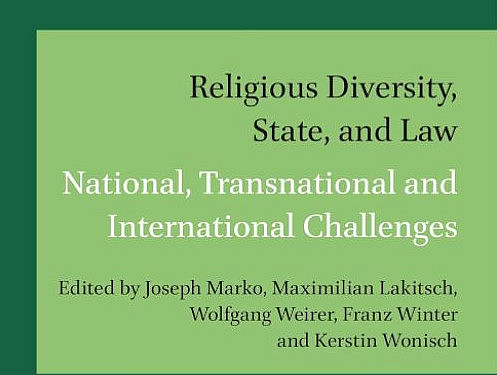
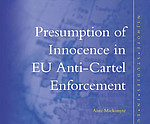
Presumption of Innocence in EU Anti-Cartel Enforcement
by Aiste Mickonyte
In this monograph, Aistė Mickonytė examines the compliance of the European anti-cartel enforcement procedure with the presumption of innocence under Article 6(2) of the European Convention on Human Rights (ECHR). The author maintains that the pursuit of manifestly severe punishment with insistence of the European Commission on administrative-level procedural safeguards is inconsistent with the robust standards of protection under the Convention. Arguing that EU anti-cartel procedure is criminal within the meaning of the Convention, this work considers this procedure in light of the core elements of the presumption of innocence such as the burden of proof and the principle of fault. The author zeroes in on the de facto automatic liability of parental companies for offences committed by their subsidiaries.
History/ies in Conflict
The Consensus and Dialogue Process in Carinthia: From Ethnic Conflict towards a Peace Region Alps-Adria?
The Alps-Adriatic region is shaped by the violent Central European upheavals in the "age of extremes" (Hobsbawm). The Austrian province (Land) of Carinthia is a prototype of these developments. It is also considered a "special case" of Austrian contemporary history. The cause lies in a national conflict that shaped the history of the Land over more than 150 years. It still forms the basis for public discussions about minority rights. The most visible expression of this ethnic conflict was a decades-long dispute over bilingual topographical inscriptions. To resolve this dispute, the federal government initiates a “consensus process” to have a solution worked out by local conflict parties. Between some of the conflict actors, this process leads to a dialogue, which aims at a deeper analysis of the routes of the conflict. The book offers an analysis of these processes, their development, limits and potential, as well as central criticisms. It is dedicated to the interplay of history, collective identities and memories. The book discusses how dialogue initiatives use methods of conflict transformation to question exclusive narratives, to initiate dialogues among the population and to create an environment for new solutions in minority issues – heading towards the establishment of a "Peace Region Alps -Adria ."
Download: click here (German).
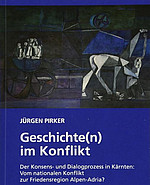
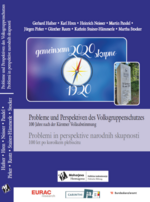
Problems and Perspectives of Minority Protection. 100 Years after the Carinthian Plebiscite
Series: skupno gemeinsam together 2020
Eds: Gerhard Hafner / Karl Hren / Heinrich Neisser/ Martin Pandel / Jürgen Pirker / Günther Rautz / Kathrin Stainer-Hämmerle
100 years after the referendum in Carinthia, the book looks back into the past and the future: Based on the legacy of the peace order of 1919/20, it deals with the history of minority policy in the 20th century and examines problems and possibilities for the development of minority protection in the 21st century. Articles are devoted to dealing with the past and conflict history(ies), illustrate successful instruments of language preservation, language planning or effective teaching models in European regions, analyze the consequences of Europeanization, urbanization and digitization for minorities, and shed light on diversity among their young members as well as the role of the diaspora for minorities and regional identities. In view of the dangers and opportunities of these factors, the question of new instruments for effective minority protection and language preservation arises 100 years after the reorganization of Europe and the establishment of the first international minority protection system. The collected contributions open up perspectives for their development - in Austria, the Alps-Adriatic region and Europe.
With contributions from:
Georg Grote, Gerhard Hafner, Elin Haf Jones, Nadia Kalb, Helmut Konrad, Milan Obid, Jürgen Pirker, Hans-Karl Peterlini, Andrej Rahten, Ilse Reiter-Zatloukal, Martha Stocker, Helmut Tichy, Hanzi Tomažič, Fernand de Varennes, Loránt Vincze, Miha Vrbinc, Marija Wakounig, Samo Wakounig, Vladimir Wakounig, Colin Williams, Lamberto Zannier, Jernej Zupančič, Deva Zwitter.
Volume 51 of the AAS History Series. History of Rocketry and Astronautics.
Proceedings of the 52nd History Symposium of the International Academy of Astronautics (IAA)
Ed. Hannes Mayer
The 2018 History of Astronautics Symposium brought together presenters on space history topics from all over the planet for the 52nd History of Astronautics Symposium held in conjunction with the 69th International Astronautical Congress in Bremen, Germany. This annual gathering of space historians took place in a city that rightfully labels itself a "space city," being the home of several important aerospace companies. The volume comprises papers on scientific technical and organizational history as well as those on legal, political and societal developments in space. The traditional session on the host country could not take place in the ordinary way. But the organizers did eventually come up with a way to compensate for this situation. Distinguished industry representatives joined the session to talk about the German contributions to astronautics after World War II.
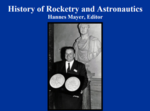

The Law and Politics of Engaging De Facto States: Injecting New Ideas for an Enhanced EU Role
by Benedikt Harzl
The secessionist entities that emerged out of the turbulent upheavals in the 1990s in the South Caucasus have, over many years and with enormous external assistance, successfully defied the jurisdiction of their metropolitan states. As entities that have attained a status of de facto statehood, they epitomize unresolved conflicts between core principles and doctrines in public international law. This study addresses the interplay between law and politics against this context and problematizes false dichotomies that have arguably hindered the transformation of these territorial disputes. The author devotes particular attention to different ways of engagement with the de facto states below the level of political.
Graz Research Contributions on Peace and Conflict
The edited volume related to the university-wide conference with the same title has just been published by Graz University Library Publishing and is freely available. (Open Access) The publication as well as the conference have been developed within the framework of an initiative of the Conflict - Peace - Democracy Cluster (CPDC) with the support of the Department of Global Governance of the Institute of the Foundations of Law. The aim of these initiatives is to make research on peace and conflict at the University of Graz more visible. Nearly 20 researchers from the University of Graz and collaborating institutions have contributed to this book project.
More about the book:
If the discourse of peace and conflict studies is already very broad, the field of scholarly engagement with the phenomena of peace and conflict is much broader. Finally, academic research on conflict and peace is spread across many different academic disciplines, even when other terminologies are applied. In fact, few researchers see themselves located witin peace and conflict studies. This creates many conceptual and thematic overlaps that ultimately go unnoticed. An increased exchange between precisely those discourses would therefore not be insignificant as a foundation for future synergies. This edited volume wants to make the beginning of such a foundation at the University of Graz and thus contribute to the dialogue for mutual scientific benefit. Accordingly, it is not surprising that the authors of this anthology cover a broad spectrum of disciplines, ranging from law, history, and political science to sociology, philosophy, cultural anthropology, and American studies.

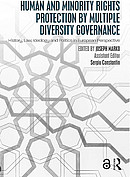
Human and Minority Rights Protection by Multiple Diversity Governance: History, Law, Ideology and Politics in European Perspective
by Joseph Marko, Sergiu Constantin
Human and Minority Rights Protection by Multiple Diversity Governance provides a comprehensive overview and critical analysis of minority protection through national constitutional law and international law in Europe. Using a critical theoretical and methodological approach, this textbook:
- provides a historical analysis of state formation and nation building in Europe with context of religious wars and political revolutions, including the (re-)conceptualisation of basic concepts and terms such as territoriality, sovereignty, state, nation and citizenship;
- deconstructs all primordial theories of ethnicity and provides a sociologically informed political theory for how to reconcile the functional prerequisites for political unity, legal equality and social cohesion with the preservation of cultural diversity;
- examines the liberal and nationalist ideological framing of minority protection in liberal-democratic regimes, including the case law of the European Court of Human Rights and the European Court of Justice;
- analyses the ongoing trend of re-nationalisation in all parts of Europe and the number of legal instruments and mechanisms from voting rights to proportional representation in state bodies, forms of cultural and territorial autonomy and federalism.
This textbook will be essential reading for students, scholars and practitioners interested in European politics, human and minority rights, constitutional and international law, governance and nationalism.
Peace in Political Unsettlement: Beyond Solving Conflict
by Jan Pospisil
International peacebuilding has reached an impasse. Its lofty ambitions have resulted in at best middling success, punctuated by moments of outright failure. The discrediting of the term ‘liberal peacebuilding’ has seen it evolve to respond to the numerous critiques. Notions such as ‘inclusive peace’ merge the liberal paradigm with critical notions of context, and the need to refine practices to take account of ‘the local’ or ‘complexity’. However, how this would translate into clear guidance for the practice of peacebuilding is unclear. Paradoxically, contemporary peacebuilding policy has reached an unprecedented level of vagueness. Peace in political unsettlement provides an alternative response rooted in a new discourse, which aims to speak both to the experience of working in peace process settings. It maps a new understanding of peace processes as institutionalising formalised political unsettlement and points out new ways of engaging with it. The book points to the ways in which peace processes institutionalise forms of disagreement, creating ongoing processes to manage it, rather than resolve it. It suggests a modest approach of providing ‘hooks’ to future processes, maximising the use of creative non-solutions, and practices of disrelation, are discussed as pathways for pragmatic post-war transitions. It is only by understanding the nature and techniques of formalised political unsettlement that new constructive ways of engaging with it can be found.
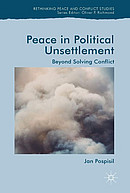
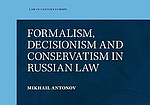
Formalism, Decisionism and Conservatism in Russian Law
by Mikhail Antonov
The volume tackles the elements of formalism and decisionism in Russian legal thinking and, also, the impact of conservatism on the interplay of these elements. Antonov addresses conservative narratives, looks into the distinctiveness of Russian law, and reveals certain features of the intellectual culture that is transmitted in legal education, scholarship and practice. These narratives are based on the idea of sovereignty understood as legal omnipotence of the state. References to sovereignty justify the requirement of legality in the sense of fidelity to the letter of the law. They also often serve as a rationale for crafting exceptions to constitutional non-discrimination principles as they are applied to political, religious, sexual and other minorities.
Office Management
Claudia Namesnik | +43 316 380 - 3602 Institut für Rechtswissenschaftliche Grundlagen https://oeffentliches-recht.uni-graz.at/de/arbeitsbereichbezemek/ |
| +43 316 380 - 3280 Institut für Rechtswissenschaftliche Grundlagen Mo.-Do. 9.00 Uhr - 12.00 Uhr, Freitags ist das Sekretariat geschlossen! http://rewi-grundlagen.uni-graz.at/ |
